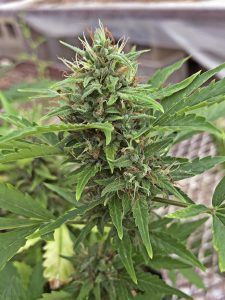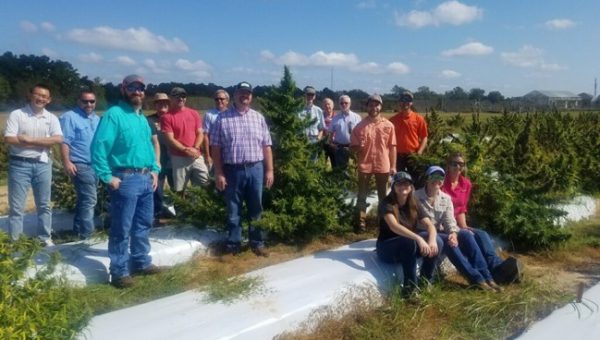De Broughton, Regional Specialized Agent for Row Crops, Moriah Williams, CALS Extension Intern, Dr. Zachary Brym, Assistant Professor of Agronomy, and Kirsten Romaguera, Public Relations Specialist

The female hemp flower can be harvested and processed to extract CBD oil. Credit: Josh Freeman, UF/IFAS
A Review of Industrial Hemp
Industrial Hemp is the same species as marijuana (Cannabis sativa); however, industrial hemp is legally distinguished by its total THC (delta-9-Tetrahydrocannabinol) level. Industrial hemp’s total THC content does not exceed 0.3 percent dry weight, whereas it is categorized as marijuana at any higher percentage.
Hemp is used for fiber, seed, oil, non-THC cannabinoids, and various other derivatives. The plant historically has been cultivated as a fiber and grain crop. In addition to these, modern hemp crops could be used for building materials, forages to feed cattle, food products for people, and essential oil extraction for CBD and other cannabinoids. Cannabidiol, or CBD, is one of over 100 cannabinoid compounds found in Cannabis that is continuing to be explored for medicinal use for a variety of ailments.
–
Why is More Research Needed in Florida?
Research scientists and Extension educators now have the task to “relearn” hemp for modern production, and to prepare for industry development in Florida. Much of the production knowledge has been lost due to hemp being classified as a Schedule I controlled substance by the United States Drug Enforcement Agency, until recent changes in law. In other countries where hemp has been legal since the early ’90s, research regarding production is available but not necessarily applicable to Florida’s environmental conditions and agricultural systems.
Specialists and extension agents have to fill knowledge gaps that include best cultivation practices, adapted varieties, control for insect and weed pests, profitability potential for Florida farmers, and invasion risk of hemp to other farm fields and natural areas. In order to generate information needed by growers, the UF/IFAS Industrial Hemp Pilot Project was launched. Ongoing years of research will validate the scientific findings and help provide producers and allied stakeholders with sound, reliable information. As more research is generated, Extension personnel will eventually be able to make confident recommendations regarding the production of industrial hemp in Florida.
–
Goals of the Program
The UF/IFAS Industrial Hemp Pilot Project is working under the long-term goal to establish hemp variety and production recommendations, while also remaining environmentally conscious. During pilot project research, hemp varieties have been assessed for plant growth, production, and health. A 14-member advisory group selected to represent diverse backgrounds in agriculture, law, and medicine was brought together to help guide the project. Group members were also selected to act as public representatives for the diverse interests and stakeholder groups related to the hemp industry in Florida.
The pilot project seeks to identify hemp varieties with resilience to environmental, ecological, and economic threats that could arise in Florida. Each variety was evaluated for THC levels, to meet the regulatory threshold, as well as for CBD content, to establish candidates for oil production.

Extension agents from across north Florida attended an informational session on industrial hemp research led by Dr. Josh Freeman at the North Florida REC in Quincy Florida in 2019.
*Photo by Libbie Johnson, Escambia County Agent
–
Taking the Industrial Hemp Pilot Project On-Farm in 2020
The next phase in continuing the hemp pilot project is to use the information collected in the first phase of research to implement on-farm trials (in tandem with continued trials at various UF/IFAS Research and Education Centers).
Agents will work with farmers across the state of Florida to establish farms that represent environmental conditions in Florida’s diverse climate across the various land, soil and cropping systems of Florida. Each farm will use the hemp varieties with genetics that simply reflect current availability for production, and represent different hemp types.
Both UF/IFAS and growers must obtain a permit to allow them to produce hemp for research through FDACS. Like the pilot project, on-farm trials will also evaluate the effects of cultivation practices on the development of hemp, monitor potential pest and disease issues, and collect both management and economic information. In total, 18 farms have been selected for the on-farm trials after a selection process that took place earlier this year.
–
Development of a State Extension Hemp Team
As the local interest of industrial hemp topics has continued to surge in recent months, the UF/IFAS Industrial Hemp Pilot Program research lead, Dr. Zachary Brym, initiated the development of a statewide Extension team. Participating agents within the team are housed in locations across Florida with expertise that represents various agricultural systems in all corners of the state. These agents have been trained to provide information to producers and the general public covering a range of basic hemp related topics, as well as preliminary research findings and Extension resources.
The link below provides a map with contact information of the members on the state industrial hemp Extension team. Please reach out to your local hemp contact for help with questions pertaining to the new crop.
Industrial Hemp Team Map
UF/IFAS Industrial Hemp Page
FDACS Industrial Hemp Page
- Farming More Efficiently with Grid Soil Testing and Precision Nutrient Application - November 12, 2021
- Calcium for Peanut Production in North Florida - May 28, 2021
- Evaluation of Controlled Release Fertilizers for Crop Production in Florida - December 11, 2020
